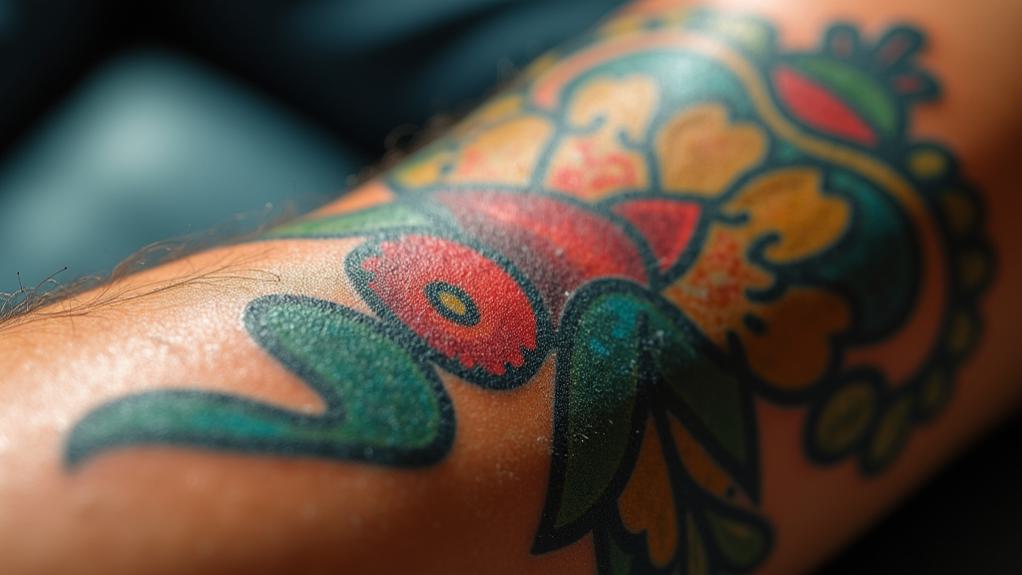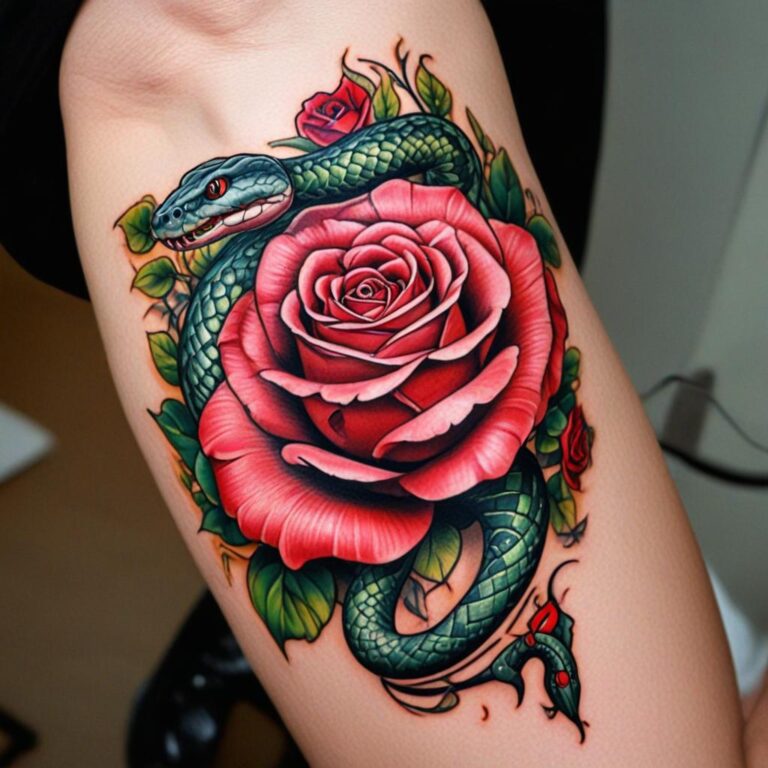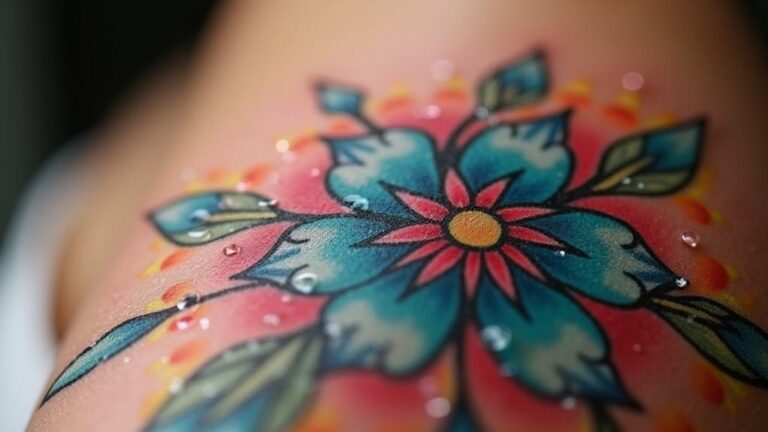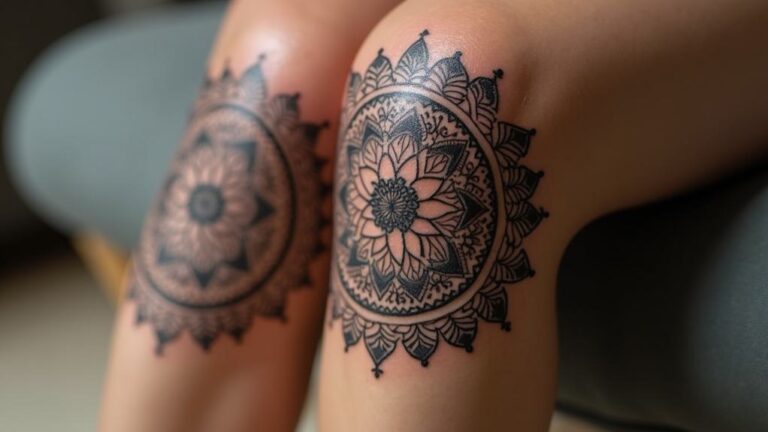A raised tattoo is a common phenomenon where the inked area of the skin feels elevated compared to the surrounding skin. This sensation can occur due to various reasons.
If your tattoo feels raised, it could be a normal part of the healing process, but it may also indicate an allergic reaction or a skin condition, such as keloids.
In this post, we will explore the factors that contribute to a raised tattoo, including environmental influences, the age of the tattoo, and tips for proper care and maintenance.
Additionally, we will discuss when it might be necessary to consult a professional for further evaluation.
Common Tattoo Healing Phases
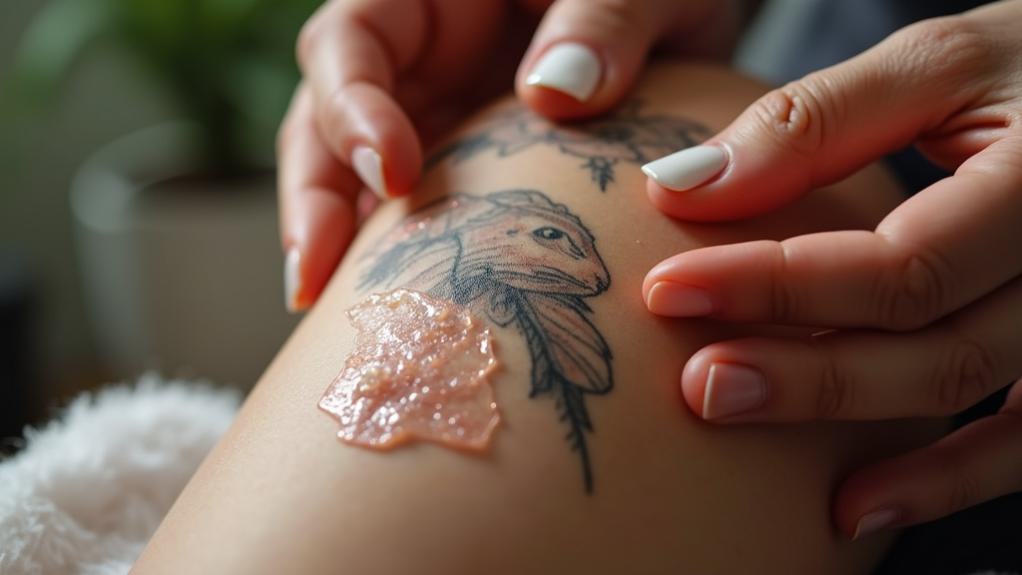
During the first few weeks after getting a tattoo, your skin may experience several healing phases. You may notice redness and swelling around the tattooed area, which is a normal inflammatory response as your body works to heal the skin.
Scabbing may form, and it's crucial not to pick at these scabs, as they protect the underlying skin during the healing process.
By the end of the first week, the scabs may start to flake off, revealing fresh skin underneath. At this point, your tattoo may feel raised, which is part of the normal healing process.
The skin may still be recovering, and the raised texture will gradually flatten over time.
Allergic Reactions to Ink
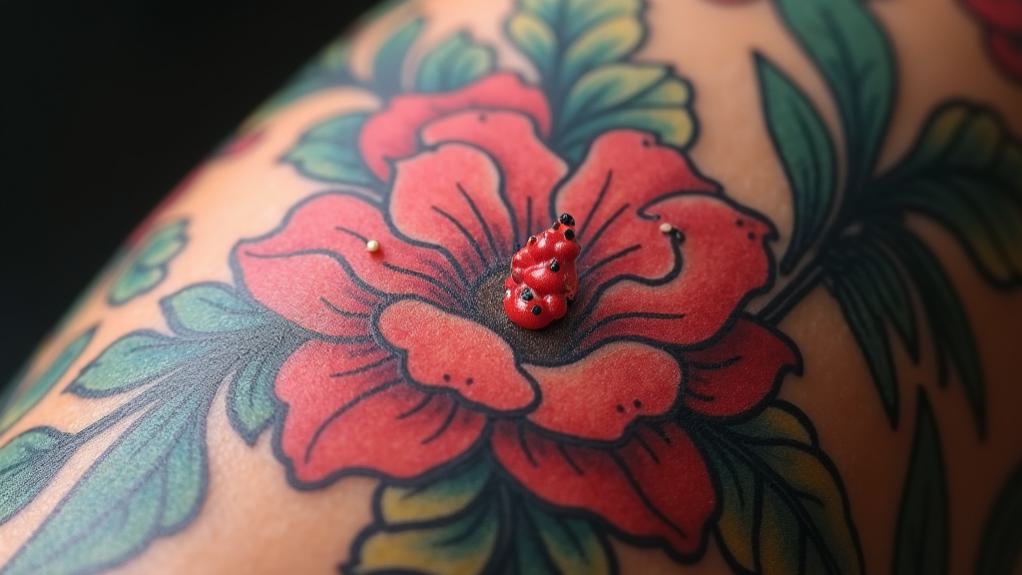
If your tattoo feels raised, it might be due to an allergic reaction to the ink.
Common allergens can cause symptoms like itching or swelling, making it essential to recognize these signs early.
Understanding how to prevent and treat these reactions can help you enjoy your tattoo without discomfort.
Common Allergens in Ink
Tattoos may lead to allergic reactions due to allergens found in the ink. Common allergens include carmine in red ink, which is derived from insects, and heavy metals like nickel, cobalt, and chromium that may be present in various inks.
Black ink may also contain carbon or other additives that could irritate your skin. Additionally, preservatives such as formaldehyde and parabens may cause issues for sensitive individuals.
If you're getting a tattoo, it's important to ask your artist about the ink's ingredients and choose brands known for using fewer allergens. Conducting a patch test beforehand may help determine how your skin reacts to the ink, potentially preventing discomfort in the future.
Symptoms of Allergic Reaction
Allergic reactions to tattoo ink may manifest as redness or swelling around the tattoo, indicating a negative reaction to the ink.
You may also experience itching or burning sensations. Hives or small bumps may develop, resulting in an uneven skin texture, suggesting your body is reacting to the ink.
Blistering or oozing can occur and may lead to infection if not addressed.
Systemic reactions, such as fever or fatigue, may indicate a more severe allergic response.
It's crucial to consult a medical professional if you suspect an allergic reaction to your tattoo ink, as early intervention may help prevent complications and ensure proper healing.
Prevention and Treatment Options
To reduce the risk of allergic reactions to tattoo ink, always choose a reputable tattoo artist who uses high-quality, hypoallergenic inks. Ask about ink ingredients and check for potential allergens. A patch test on a small skin area may help determine your body's reaction.
If you have allergies or sensitive skin, consulting with a dermatologist before getting a tattoo may be beneficial. They may recommend specific inks that are less likely to cause reactions.
Ensure the tattoo artist follows proper hygiene practices during the procedure to minimize infection risks that could worsen allergic reactions.
In case of an allergic reaction, treat it promptly. Over-the-counter antihistamines may help manage mild symptoms, while topical corticosteroids may reduce inflammation.
Seek immediate medical attention for severe reactions. In some cases, tattoo removal may be necessary, so staying informed about your options may empower you.
Skin Conditions Affecting Tattoos
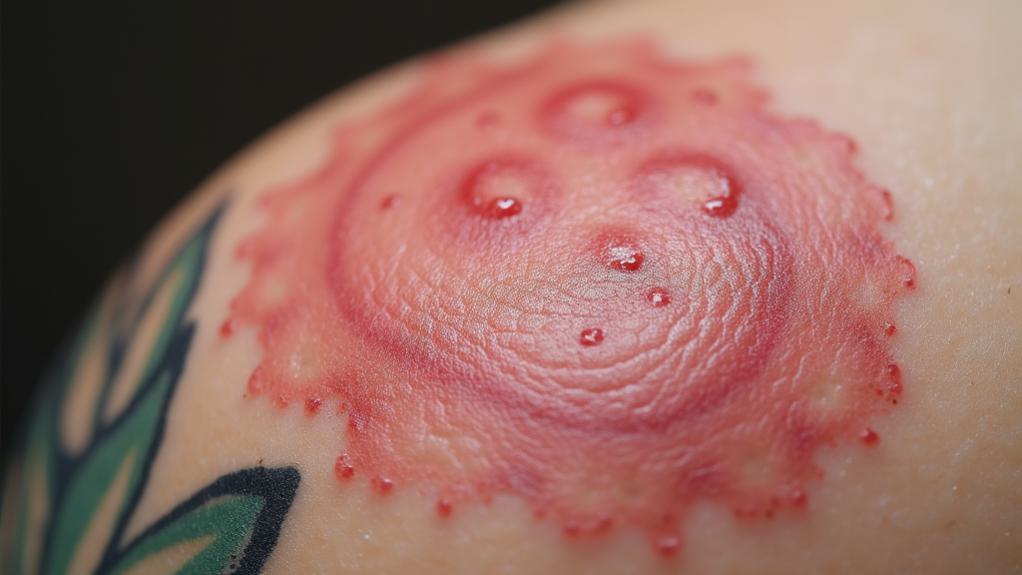
When it comes to tattoos, skin conditions can play a significant role in how they appear and feel.
You might experience allergic reactions to the ink, develop keloids or scarring, or notice symptoms of infection.
Understanding these issues can help you take better care of your tattoo and guarantee it stays looking its best.
Allergic Reactions Explained
Tattoos may trigger allergic reactions that cause your ink to feel raised and uncomfortable. Common allergens in tattoo inks may include certain metals like nickel and chromium, or specific dyes. If your tattoo becomes inflamed or itchy, you may be experiencing an allergic response.
If you have sensitive skin or a history of allergies, you may be more prone to these reactions. Symptoms such as swelling, redness, or persistent discomfort may indicate an allergic reaction, and it's advisable to consult a dermatologist for identification of the specific allergen and suitable treatment options.
Patch testing may be necessary to determine the exact cause of your skin's reaction. To prevent allergic reactions, always ask your tattoo artist about the ingredients in their inks and consider conducting a patch test on a small area of skin before getting a larger tattoo.
Keloids and Scarring
Keloids and scarring may lead to raised areas on your skin, especially where you've had a tattoo. If you're prone to keloids, the tattooed area may develop a thick, raised patch of tissue due to overproduction of collagen during the healing process.
Scarring may also occur from factors like trauma, infection, or poor tattooing techniques.
Key points to note about keloids and scarring include:
- Keloids may appear weeks or months after getting your tattoo.
- They may feel itchy or tender to the touch.
- Treatments like silicone sheets or steroid injections may help reduce their appearance.
- Keloids may be more common in individuals with darker skin tones.
- It's crucial to consult a dermatologist if you're concerned about raised areas on your tattoo.
Understanding these factors may help you address any issues with your tattoo and guide you on the best steps to take for treatment or prevention.
Take care of your skin, and don't hesitate to seek professional advice if you notice any changes.
Infection Symptoms Identified
After getting a tattoo, you may notice signs of infection, which can develop in the days following the procedure.
Key symptoms to look out for include:
- Increased redness around the tattoo area that expands or doesn't fade after a few days may indicate an infection.
- Excessive swelling, beyond the normal response to a tattoo, may be a warning sign.
- Unusual warmth emanating from the tattooed area compared to the surrounding skin may suggest infection.
- Pus or any discharge from the tattoo site may signal an infection.
- Fever and chills occurring alongside these symptoms may necessitate immediate consultation with a healthcare professional.
Recognizing these symptoms early may help prevent more serious complications.
Acting quickly may make a considerable difference in your recovery and help preserve the integrity of your tattoo.
The Role of Keloids
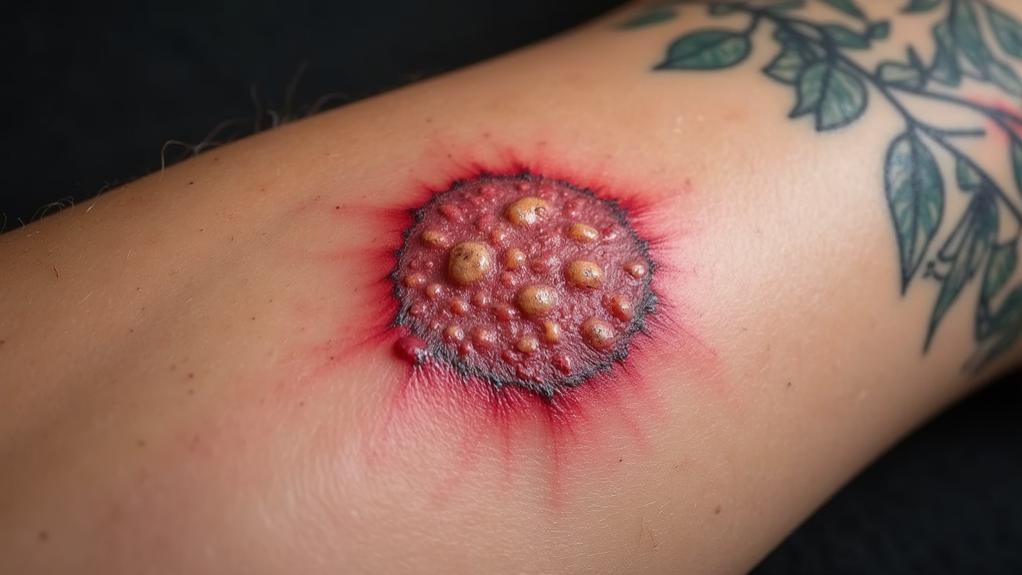
When your tattoo feels raised, keloids may be the cause. Keloids are overgrown scar tissues that can develop at the tattoo site, resulting in a bumpy or elevated texture. They may occur due to excess collagen production during the healing process.
Key points about keloids and tattoos include:
- Genetic Predisposition: A family history of keloids may increase your risk.
- Skin Type: Individuals with darker skin tones may experience keloids more frequently than those with lighter skin.
- Tattoo Size and Location: Larger tattoos or those in tension-prone areas (like shoulders) may be more susceptible to keloid formation.
- Injury or Irritation: Scratching or irritating your tattoo during healing may trigger keloid development.
- Prevention: Consulting a dermatologist before getting a tattoo may be advisable, especially if you have a history of keloids.
If you observe a raised area, seek professional advice to determine the best course of action for your skin.
Infection and Raised Tattoos
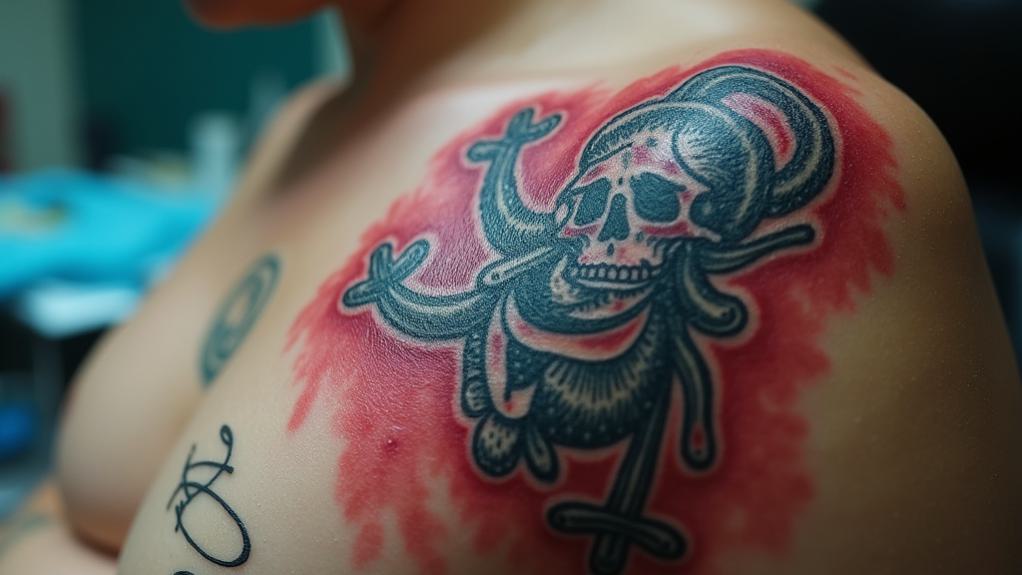
If your tattoo feels raised and you notice signs of infection, it's essential to act quickly.
Common symptoms include redness, swelling, and pus, which can indicate that your tattoo isn't healing properly.
Knowing how to treat and prevent infections can help protect your skin and keep your tattoo looking its best.
Signs of Infection
A raised tattoo may signal an infection. Watch for these signs of infection:
- Increased redness: More redness than usual around the tattoo may indicate inflammation.
- Warmth: Warmth upon touching the tattoo may suggest an underlying infection.
- Swelling: While some swelling is normal after getting a tattoo, excessive swelling may be a red flag.
- Pus or discharge: Presence of pus or abnormal discharge may require immediate medical advice.
- Fever: A fever may indicate a more systemic infection, especially if accompanied by other symptoms.
If you notice any of these signs, consult a healthcare professional.
Early intervention may prevent complications and help maintain your tattoo's integrity.
Prioritize your health and act if something feels off.
Treatment Options Available
Addressing a raised tattoo linked to infection requires immediate consultation with a healthcare professional.
They may prescribe antibiotics if a bacterial infection is suspected, as untreated infections may lead to serious complications.
For swelling and pain, over-the-counter anti-inflammatory medications may help alleviate discomfort.
A clean, non-stick bandage may protect the area from further irritation, but it should be changed regularly.
In some cases, a doctor may recommend corticosteroid injections to reduce inflammation and flatten the tattoo.
If the raised area is severe, surgical intervention may be necessary to remove infected tissue.
Keeping the tattoo clean is essential; wash it gently with mild soap and water, then pat it dry.
Avoid using creams or ointments without consulting your doctor, as some products may worsen the infection.
Prevention Tips and Care
To prevent your tattoo from becoming raised or infected, prioritize proper care during the healing process. Here are essential tips:
- Keep it clean: Gently wash your tattoo with mild soap and water to remove dirt and bacteria, which may help prevent infection.
- Moisturize regularly: Using a fragrance-free lotion or tattoo-specific ointment may keep the skin hydrated and promote healing.
- Avoid sun exposure: Protect your tattoo from the sun by covering it or applying a high-SPF sunscreen once it's healed, as sun exposure may fade your tattoo and cause irritation.
- Don't pick or scratch: Resisting the urge to touch or scratch the tattoo may help avoid introducing bacteria and causing irritation.
- Wear loose clothing: Loose clothing may prevent friction against the tattoo, reducing the risk of raised skin or infection. Opt for breathable fabrics during the healing process.
Scarring and Texture Changes
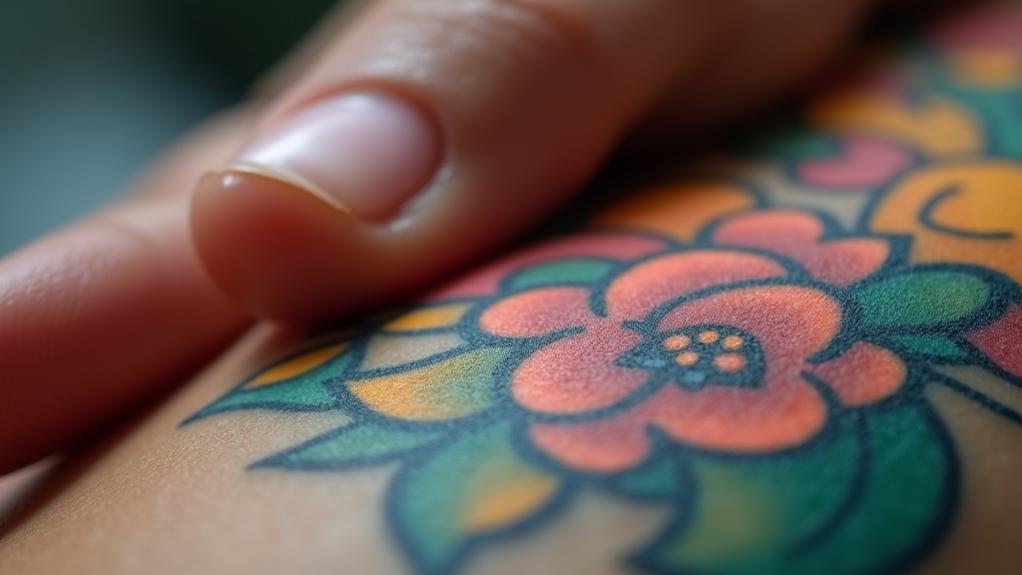
Raised tattoos may indicate scarring and texture changes during the healing process. Excess collagen production can lead to a raised appearance, especially in areas with more movement or tension.
Texture changes, such as bumps or unevenness, may also occur if the tattoo wasn't properly cared for or if you have sensitive skin. Avoid scratching or picking at your tattoo, as this may worsen scarring and affect its final appearance.
Certain ink colors may react differently with your skin, potentially causing more noticeable texture changes. If your tattoo feels raised and you're concerned about scarring, monitor it, as these changes may fade over time.
However, if they persist or worsen, consulting a professional tattoo artist or dermatologist is advisable. They may assess your tattoo and recommend treatments to improve its appearance.
Environmental Factors
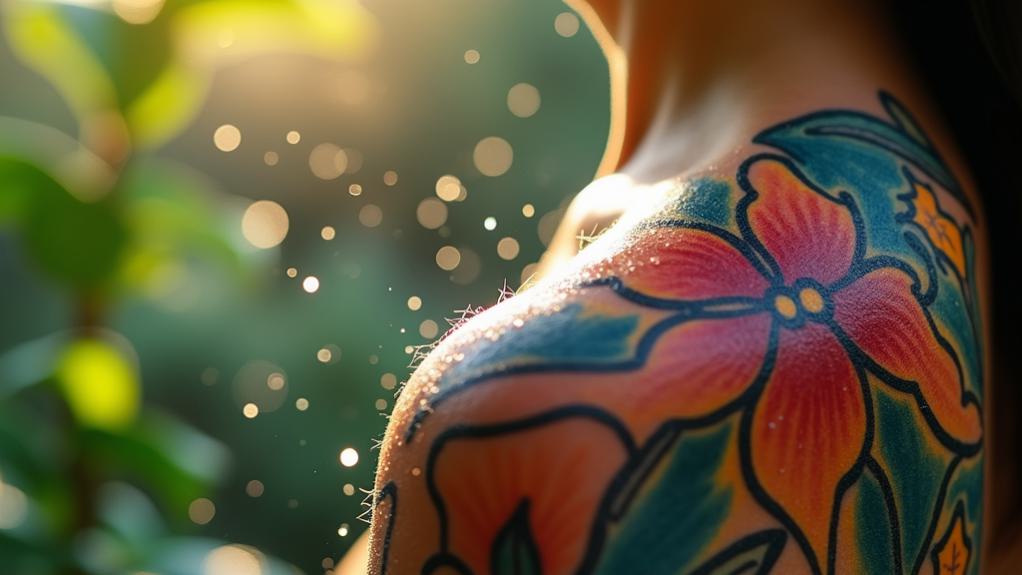
Environmental factors may significantly affect how your tattoo heals and feels over time.
- Humidity: High moisture levels may lead to skin swelling.
- Temperature: Extreme heat may make your skin more sensitive and raised.
- Sun Exposure: UV rays may cause irritation, making tattoos feel raised.
- Pollution: Dust and pollutants may irritate the skin, affecting healing.
- Swimming: Chlorinated or saltwater may aggravate your tattoo, leading to raised skin.
Consider these factors to promote better healing of your tattoo.
Tattoo Age and Maintenance
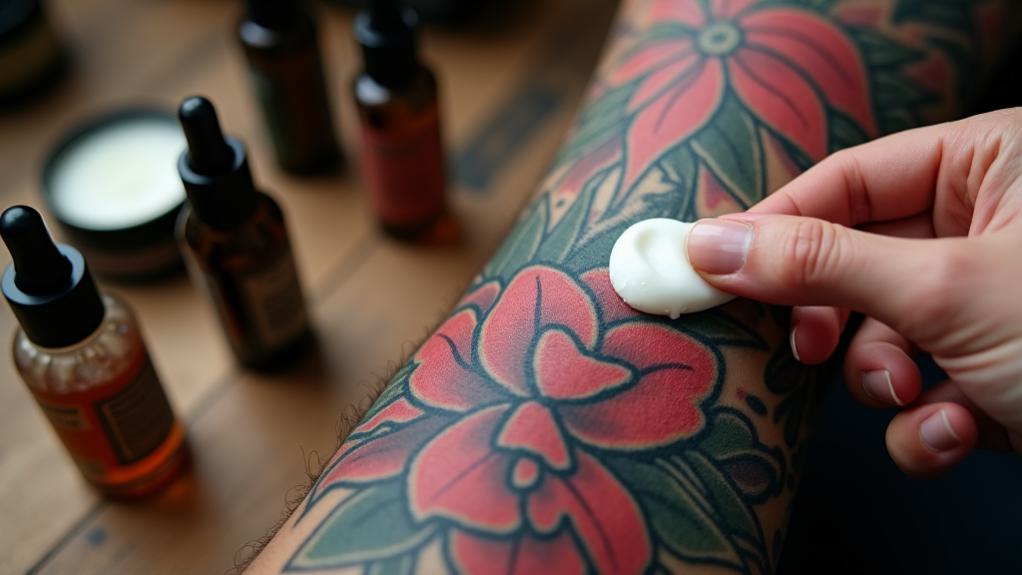
The age of your tattoo and the maintenance it receives may significantly affect how it feels over time.
Older tattoos may feel raised due to the natural healing process of your skin, which can cause the ink to shift. Regular maintenance, such as keeping your skin moisturized, may help maintain elasticity and prevent raised areas.
Neglecting your tattoo may result in it feeling raised and appearing faded or uneven. Additionally, sun exposure may break down ink and affect skin texture.
How to Care for Raised Tattoos
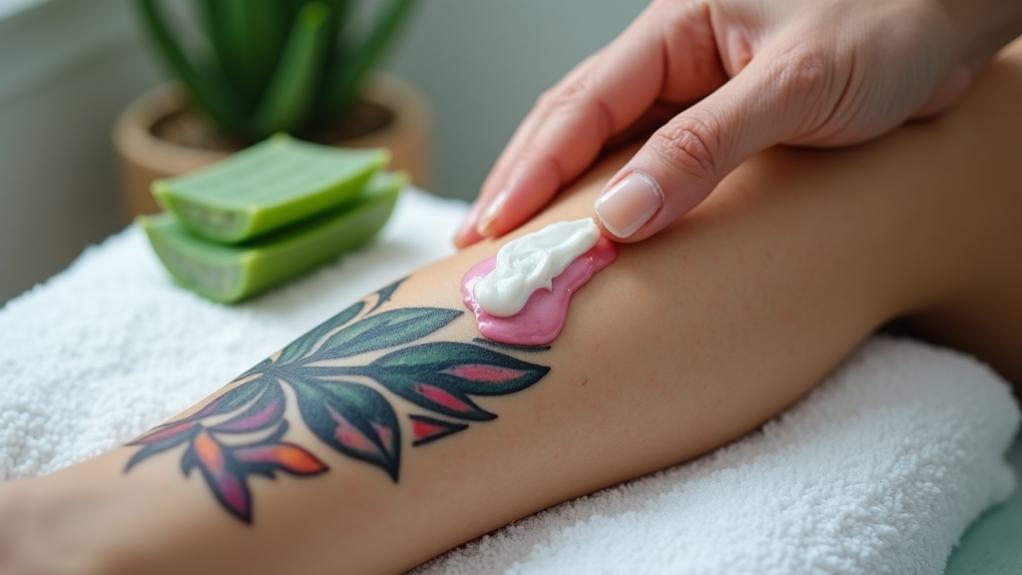
To care for a raised tattoo, focus on cleanliness, moisturizing, sun protection, and avoiding friction.
- Clean the area daily with mild soap and water, then pat it dry with a clean towel. Scrubbing may irritate the skin.
- Use a fragrance-free lotion or tattoo-specific ointment to keep the skin hydrated, as this may prevent dryness and reduce irritation.
- Apply broad-spectrum sunscreen with at least SPF 30 whenever exposed to sunlight, since UV rays may damage the tattoo.
- Choose loose-fitting clothing to minimize friction against the raised area.
Quick checklist for raised tattoo care:
- Clean daily with mild soap and water.
- Use fragrance-free moisturizer or ointment.
- Apply sunscreen when outdoors.
- Avoid tight clothing around the tattoo.
- Don't pick or scratch the area.
When to Seek Professional Help
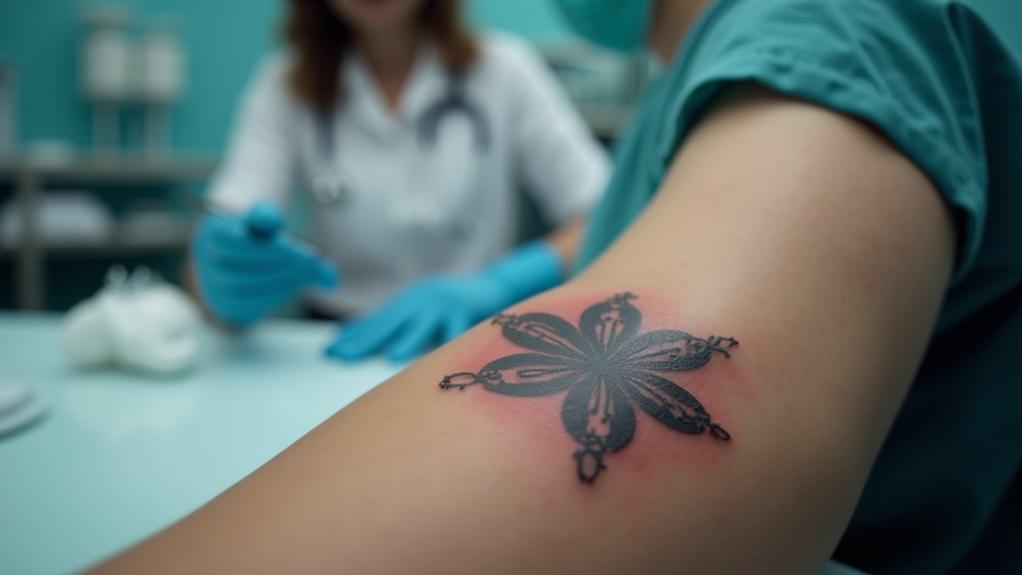
When to Seek Professional Help
If your tattoo has suddenly become raised, red, or warm to the touch, you may be experiencing signs of an infection or an allergic reaction, and it's crucial to consult a dermatologist or your tattoo artist.
Persistent itching, oozing, or a foul odor from the tattoo may indicate a more serious issue that requires medical attention.
Additionally, if the raised area continues to grow or changes color, this may signal underlying problems.
Discomfort lasting beyond the typical healing period shouldn't be ignored.
Trust your instincts; if you're in doubt about your tattoo's condition, seeking professional advice is always the safest option.
Frequently Asked Questions
Can Tattoos Feel Raised After Prolonged Exposure to Sunlight?
Yes, tattoos may feel raised after prolonged exposure to sunlight.
When your skin gets sunburned, it may cause swelling and irritation, which may make your tattoo appear raised. The UV rays may also break down the ink over time, leading to changes in texture.
To prevent this, it may be helpful to always apply sunscreen to your tattoos when you're out in the sun. Keeping your skin moisturized may help maintain the tattoo's appearance and feel, too.
Do Certain Ink Colors Cause More Raised Tattoos Than Others?
Certain ink colors may cause more raised tattoos than others.
Generally, darker inks like black and blue may settle better in the skin, while lighter colors, especially reds and yellows, may cause more irritation or an allergic reaction.
If you notice your tattoo feeling raised and it's a lighter color, it may be worth discussing with your tattoo artist or a dermatologist to determine the best options for your skin.
Is It Common for Older Tattoos to Suddenly Feel Raised?
It's not uncommon for older tattoos to suddenly feel raised.
Over time, your skin may change due to factors like aging, sun exposure, or even weight fluctuations. These changes may affect the way the tattoo sits on your skin.
If you notice any unusual changes, it may be a good idea to keep an eye on it.
If it persists, consulting a dermatologist may help you understand what's happening and ensure everything's okay.
Can Stress Affect the Texture of My Tattoo?
Yes, stress may affect the texture of your tattoo.
When you're stressed, your body may produce cortisol, which may lead to inflammation and changes in skin texture. You might notice your tattoo feeling raised or more sensitive during stressful times.
Staying hydrated, managing stress, and maintaining a good skincare routine may help keep your tattoo looking smooth.
If you're concerned, it may be wise to consult a dermatologist for advice.
How Does Hydration Impact My Tattoo's Raised Texture?
Hydration may significantly impact your tattoo's raised texture.
When you're well-hydrated, your skin may stay supple and elastic, which can help minimize any raised areas. Conversely, if you're dehydrated, your skin may become dry and tight, potentially making the tattoo feel more raised or uneven.
Drinking enough water not only may benefit your overall health but also may help maintain the appearance of your tattoo, keeping it looking fresh and vibrant.
Stay hydrated for the best results!
Conclusion
To sum up, if your tattoo feels raised, don't panic—it's often part of the healing process or a reaction to various factors. By understanding the causes and taking proper care, you can help minimize any discomfort. Monitor your tattoo for any changes, and remember, it's always best to consult a professional if you have concerns. Keeping your tattoo clean and moisturized is key to ensuring it heals beautifully. Stay informed and take good care of your art!

